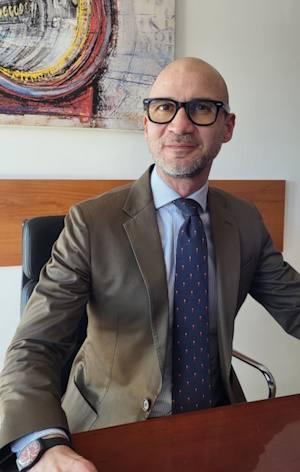Head of Health, Safety, Environment & Sustainability
A year of challenges and opportunities to put health, safety, environment and sustainability at the heart of corporate strategy.
The Health, Safety, Environment & Sustainability Organisational Unit has only recently been established: what are the main challenges you have faced in this first year?
The creation of the Health, Safety, Environment & Sustainability (HSE&S) Organisational Unit was an important step forward in our corporate and social responsibility strategy. This new model has made it possible to bring together and harness the skills already present within LGS, creating a structure that will ensure a more integrated and effective way of managing health, safety, environment and sustainability.
In this first year, LGS has taken an increasingly active role in overseeing all major sustainability initiatives - particularly in the Energy, Water and Waste Management sectors - that require continuous coordination with all Group Divisions. Our mission is to translate the corporate strategic guidelines into practical operational programmes and investments, thus ensuring effective support for the achievement of the Group's sustainability targets. Our approach is results-oriented, aiming not only to generate tangible benefits for people and the environment, but also to contribute to the long-term success and competitiveness of the business.

Group Sustainability Report: what contribution does LGS make through the commitment of the Health, Safety, Environment & Sustainability structure?
Through the work of the Health, Safety, Environment & Sustainability Unit, LGS makes an important contribution to the Leonardo Integrated Report, providing hard data, measurable action plans and concrete initiatives that reflect our commitment to achieving ESG objectives.
We are also working to improve the entire process of data collection and management, in close cooperation with the Corporate Finance and IT functions, with the aim of ensuring increasingly accurate, timely reporting in line with international standards.
Our contribution is also a cultural one: we help the company not only to communicate its achievements, but also to convey the determination and seriousness with which we address environmental, social and economic challenges every day. We are conscious that sustainability is not a static goal, but rather a path of continuous improvement that requires commitment, vision and responsibility.
How are you adapting Health, Safety, Environment & Sustainability strategies to address unforeseen challenges related to global crises, such as health, energy or climate, and what lessons have you learned so far?
We have adopted a dynamic, proactive approach, based on constant monitoring of risks and analysis of evolving scenarios. We carefully monitor all the main risk factors, with the aim of not only controlling them, but also anticipating them thanks to the adoption of certified management systems, which allow us to guarantee the optimum level of control and traceability, and continuous dialogue with the various operational structures.
With regard to energy, water and waste management, we are working to implement long-term Efficiency and Investment Programmes, which help modernise the plants in which the various Divisions operate, along a continuously evolving path focused on the sustainable use of resources.
With regard to workers' health and safety, we have reinforced our prevention, training and active reporting processes. At the same time, in supply chain management, we are applying strict controls and regular audits on suppliers to ensure they meet our health and safety standards.
Lastly, on the environmental front, we are continuing along the path of standardising the processes for restoring environmental parameters, so that they are not only effective, traceable and consistent throughout the Group, but also tackled with a sustainable approach right from the outset .
Global crises have taught us that resilience is something one builds day after day: with flexible governance, sound skills and technology that can drive quick and responsible decisions.
Technological development to promote sustainable development: where are we and what is the outlook?
We have started digitisation projects in environmental monitoring, energy optimisation and security management systems, playing an active role in the implementation of new applications. In fact, our vision of technology is not as an end in itself, but as an accelerator that enables us to streamline process management and make more informed and timely decisions. Looking ahead, we are focusing on integrating data, artificial intelligence and sustainable development to support balanced and resource-friendly growth.
Is there any message you would like to share?
In a rapidly changing industrial environment, building a sustainable future means integrating Health, Safety, Environment and Sustainability as structural elements of the business. Safer and sustainable manufacturing sites not only ensure business continuity, but also represent a real competitive advantage for the Group.
Our activity is not ancillary, but strategic: we contribute directly to the resilience, efficiency and reliability of industrial processes. LGS is proving to be a driver of change and progress, with a central role and skills that are guiding Leonardo towards a model that is increasingly responsible, long-term oriented and capable of meeting the expectations of a changing world.
It is with this knowledge that we face every challenge: the knowledge that our work is generating value today, and building the foundations for a more solid and sustainable tomorrow for everyone.

